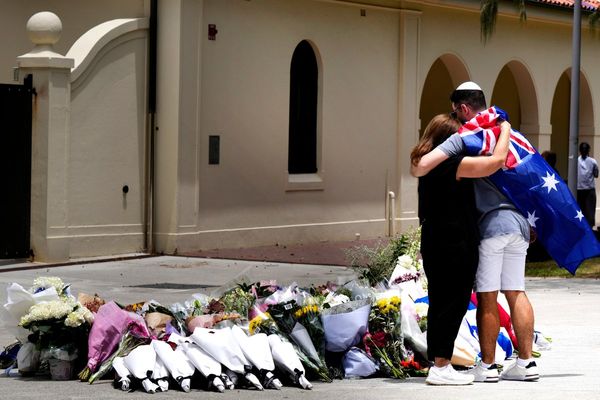Meet Ángela Cano, a Colombian actress who played a brave flight attendant on Netflix’s The Hijacking Of Flight 601, a new short series set in 1973, which depicts the true story of one of the longest aerial hijackings in Latin American history.
The retro-infused series centers around two armed assailants from Paraguay, played by Valentin Villafañe and Alian Devetac, who hijack an airliner and put the Colombian government under pressure by demanding the release of 50 political prisoners and a large ransom.
The series is based on the May 30, 1973, hijacking of SAM Colombia Flight HK-1274, where two Paraguayan soccer players — Francisco Solano López and Eusebio Borja — held the plane and its more than 80 passengers at gunpoint for a ransom of $200,000 and demanded that the Colombian government release dozens of guerrillas from prison.
Netflix’s dramatized version of the events highlights the flight attendants’ bravery, in particular, Edilma Perez, played by Mónica Lopera, who is based on a real-life person.
Nevertheless, not all elements from the series need to be based on reality to embody the fortitude of the story, as exemplified by Ángela’s character, flight attendant Bárbara Gallo/Maria Eugenia, who is partially fictional but stands out on the screen as a force to be reckoned with.
“[They teach us that] to be a woman. You have to smile and stay silent. Not just to be a woman; [but] to be human. In order to be accepted, you have to tell people what they want to hear,” the actress exclusively told Bored Panda in an interview.
The Hijacking Of Flight 601’s Ángela Cano pictured with her beloved Dobermans, Salem, and Tarantino
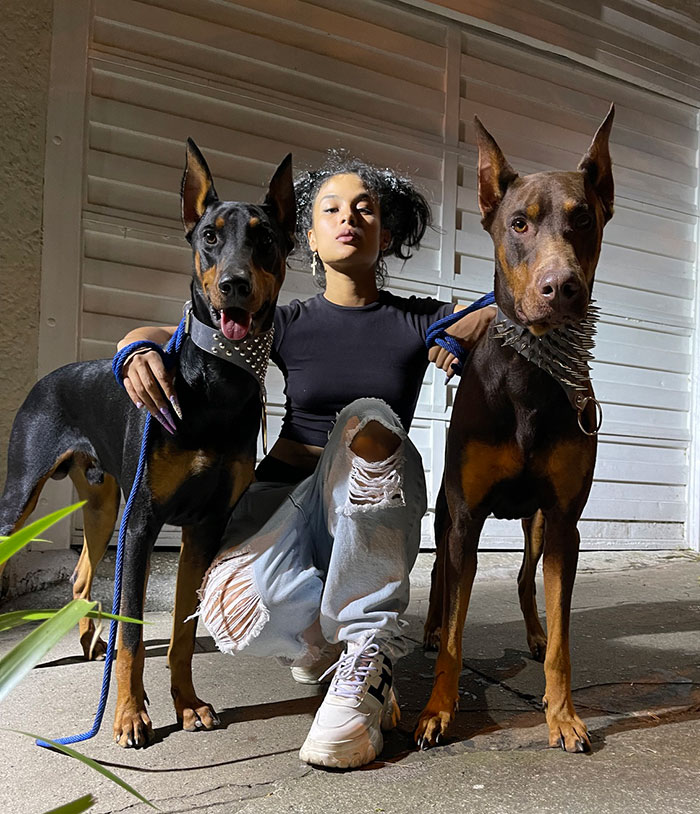
Maria Eugenia really did exist, but the adopted fake identity, “Bárbara,” portrayed in the series was fabricated to reflect the character’s struggles with self-acceptance.
When watching Hijacking, amid the obvious violence, crime, and tragedy, it would be hard to ignore the resilience Edilma (Edi) and Bárbara display throughout the show. More so, their ability to “keep on smiling” and remain beautiful regardless of the horrific circumstances.
“Flight attendants were practically used like dolls,” Ángela said. “In fact, from what I’ve read, people could touch them. They dressed them in short skirts and small uniforms to attract passengers.”
The Medellín resident has a point. From the 1960s to the 1980s, those wealthy enough to travel by plane experienced the golden age of flight attendants, who were equally as glamorized and admired as they were sexualized and objectified.
By the mid-1960s, flight attendants encountered marketing campaigns and dress codes that increasingly suggested their sexual availability, particularly in the advertising presented by regional airlines, PBS reported.
Ángela Cano played flight attendant Bárbara Gallo/Maria Eugenia, a character who is partially based on a real person
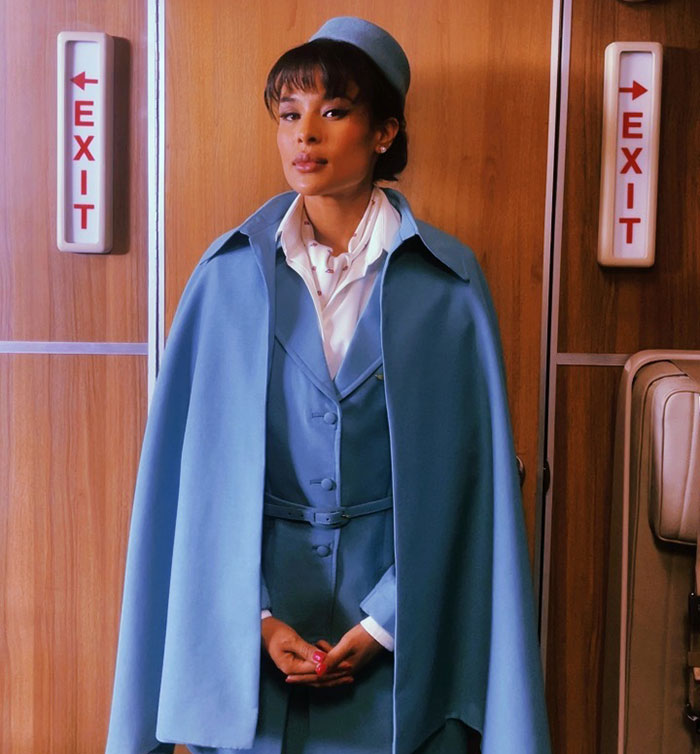
Inevitably, misogyny significantly influenced the dynamics of the show, emphasizing a reality that can still be observed in today’s traditionally masculine workplaces.
“It’s crazy that Edi can be judged for abandoning her children, but Captain Wilches isn’t,” the talent, who trained as a theater actress, argued.
In Netflix’s Hijacking, Edi leaves her three sons behind so she can work as a full-time flight attendant before finding herself fighting to board the doomed Aerobolivar Flight 601 in a bid to keep her job.
The real-life Edi was 32 years old at the time of the incident and also a single mother with five children. The show accurately depicted aviation companies’ former policies that excluded women with families from working as what was then called “air hostesses.”
The real SAM Airlines (or fictional Aerobolivar) made an exception for Edi, but her struggle to always arrive on time and the lack of work flexibility brought judgment on her role as a mother.
“In order to be accepted, you have to tell people what they want to hear,” the actress said
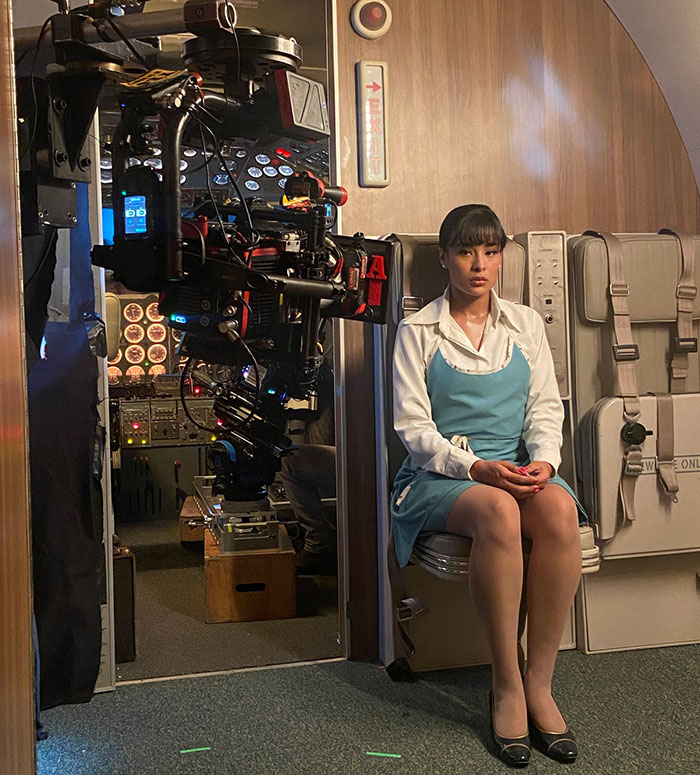
Pilots, however, are a role that is still predominantly upheld by men to this day, and they were treated with respect and adoration despite spending prolonged periods of time away from their families, as exemplified by Hijacking’s main pilot, Commander Richard Wilches, played by Christian Tappán.
But in male-dominated workplaces, women frequently form tight-knit bonds akin to a sisterhood, a form of solidarity that Edi and Bárbara undeniably convey on the screen. Depicting this bond in the series came naturally for both Ángela and Mónica.
“I met Mónica on Frontera Verde, where we also had several scenes together. I fell in love with her because she’s an incredible actress. When we met again on this project, both of us knew we had to reignite that chemistry,” Ángela recalled.
Frontera Verde is a Colombian series where the actress plays an indigenous woman named Ushe, who lives in the jungle.
Ángela continued: “Chemistry is sometimes very difficult to act out; sometimes, even impossible, right? But both of us connected immediately. I can’t even describe how we did it because it was something very, very genuine. We weren’t acting.
“Plus, Mónica is really hardworking and is one of the few actresses I know who acts for others. She’s not acting for herself; she doesn’t have that actress ego—both of us were acting together. Because that’s also what true friendship is about.”
Ángela’s on-screen friendship with Mónica Lopera, who plays the non-fictional character Edilma Perez, was genuine in real life
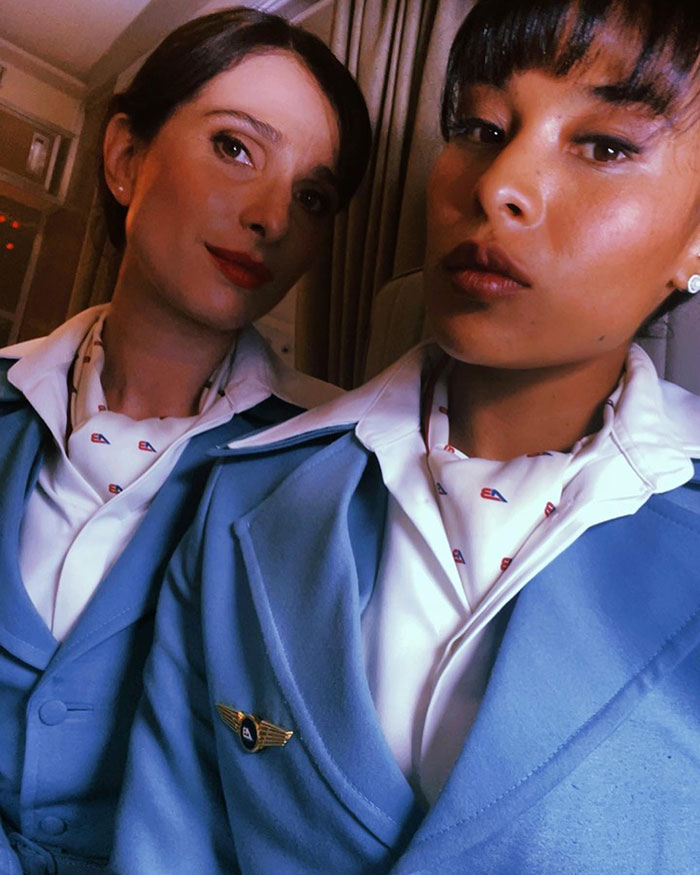
Ángela was born in El Carmen de Viboral, a town in eastern Antioquia, to which, according to her, she owes her passion for art and acting as a result of its local international theater festival, Gesto Noble.
“I’ve always wanted to be an actress. Since I was little, I escaped reality through games,” the performer said. “I didn’t even know that acting and theater could be studied. It was my older brothers who told me, ‘Why don’t you study theater?’ because they saw that I really liked being in another world.”
At the young age of 16, Ángela moved to the much bigger city of Medellín and later went on to study acting at the University of Antioquia in a program called Master of Dramatic Art.
“Since then, I haven’t worked on anything other than acting,” she admitted.
“Flight attendants were practically used like dolls,” Ángela explained, speaking about the golden age of “air hostesses”
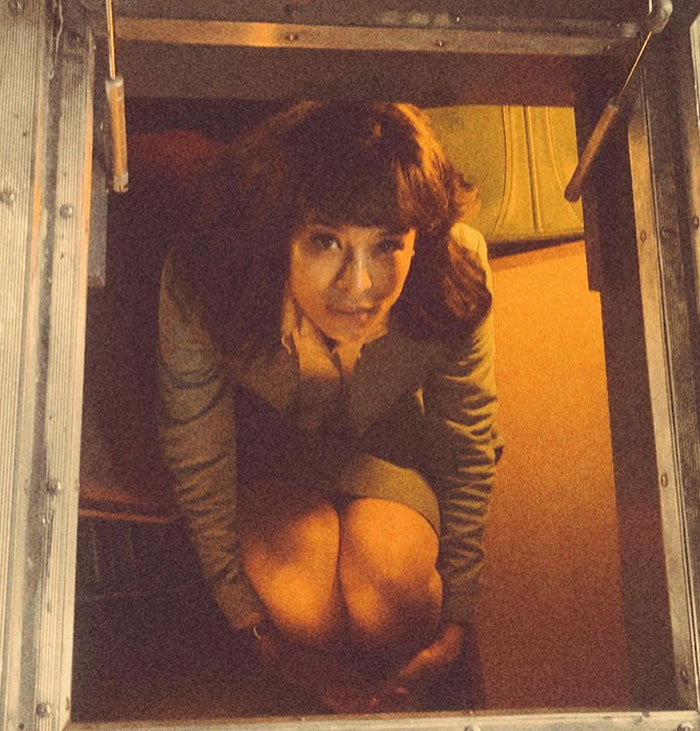
Ángela, who is indigenous and also identifies as “black” in the context of Latin America, enjoyed an artistic academic path, which, to some extent, contributed to shaping her outlook on discrimination, subsequently choosing to ignore it.
Nevertheless, ethnicity-based marginalization is still very much prevalent in Colombia despite the extremely diverse population.
“I identify a bit with Bárbara; we both share that mindset of ‘there’s no tomorrow’ and prioritizing the present,” the actress said.
In the Netflix series, Bárbara’s ethnic identity is a topic of conversation, which is showcased through numerous racist interventions.
In one episode, Manchola, played by Marcela Benjumea, the flight attendant’s boss, tells Bárbara that she can’t put on enough makeup to hide “those indigenous traits.”
When Ángela isn’t busy acting, she enjoys a second passion: “Burlesque is not just a show but a lifestyle”
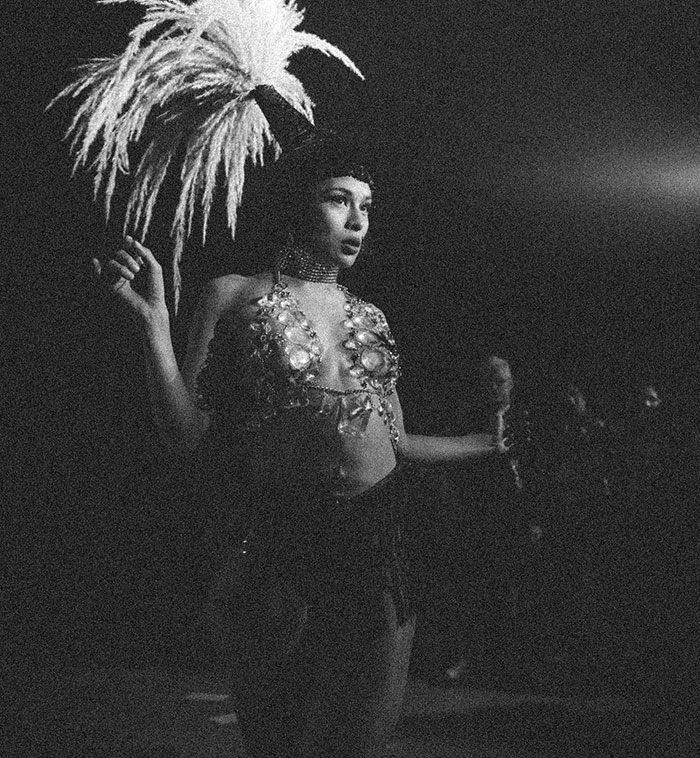
In another episode, wealthy first-class passengers aboard the hijacked Aerobolivar plane brutally dismiss Bárbara as a result of the darker complexion of her skin.
“While in my career, I haven’t felt discrimination, [but] I did feel it a lot when I was little. I remember that my own friends would exclude me from games, and I didn’t understand why,” Ángela recalled.
“When I was little, I wanted to be white. I’d say, ‘Oh, why am I black?’ And my mom would tell me, ‘Among roses and lilies, the darker ones are the best.’ I don’t know if I’ve missed out on any projects because I’m black. But there are still these abysses of racism and elitism in society. It doesn’t affect me anymore,” she confidently affirmed.
Nevertheless, Ángela admitted that racism persisted in her home country today. “We have a Black vice president, yet many people are still uncomfortable with it. There are still many issues of classism and elitism, so much so that calling someone ‘indio’ (indigenous) is still considered an insult,” she explained.
The actress continued: “And here in Colombia, we are Indios. I feel that there are still some people here who kneel before foreigners, who still consider calling someone ‘negro’ (‘black’ in Spanish) an insult. So, it seems urgent to me that these issues be discussed.”
“It’s crazy that Edi can be judged for abandoning her children, but Captain Wilches isn’t,” Ángela said, challenging the double standards
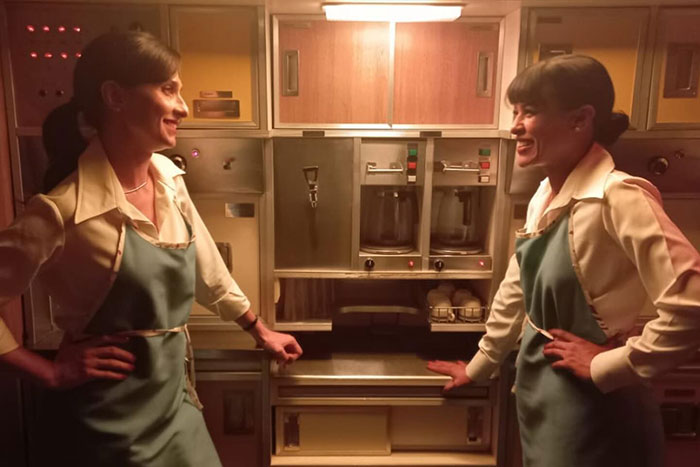
The steadfast theatrical talent stressed that “we are all equal” before using Hijacking as an interesting metaphor: “A plane is like a box of eggs: if it falls, we all break the same way. All the eggs will crack, whether they are in first class, second class, or wherever.”
The series touches on class disparities issues, with Commander Wilches, a white man, disputing the hijackers about their criminal life choices, reinforcing his idea that despite coming from a “hungry” family himself, he worked hard enough to become a successful pilot.
The series contrasts the pilot’s statements on work ethic with the hijackers, who are shown to come from extremely impoverished backgrounds.
Meanwhile, Bárbara, who has already fought disadvantages as a woman of color, challenges the commander and his privilege, a debate Ángela also stands by in real life.
Netflix’s series dramatizes the real 1973 hijacking of SAM Colombia Flight HK-1274
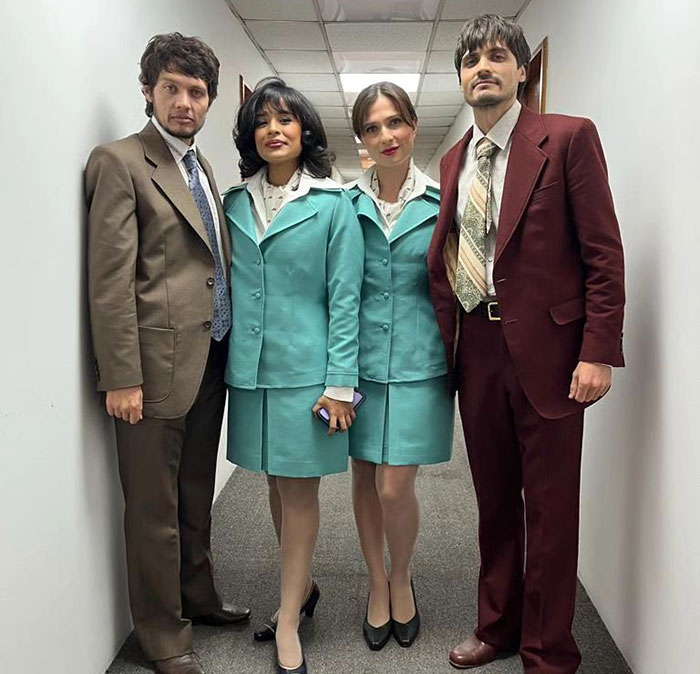
“There are still not the same opportunities for everyone,” she said. “That’s also addressed in the show. What about ‘the early bird catches the worm’ or ‘dreaming is free’? These sayings don’t apply to everyone. The same sun rises for everyone, but it doesn’t shine on everyone equally. There are things—political and social circumstances—that make life harder for some than for others.”
Despite the constant parallels drawn between the Netflix show and real life, Ángela still felt surprised by some aspects of the hijacking story.
“The fact that [the flight attendants] boarded the plane voluntarily despite any personal circumstances they might have faced at the moment,” she laughed. “It struck me a lot that it was real because I didn’t know the story. I knew that Colombia had the longest hijacked flight in Latin America, but it wasn’t talked about in my family.”
Ángela’s progression from theater to screen acting happened in a matter of weeks upon being cast in Frontera Verde. She has since felt proud that her work has been available globally.
“It’s incredible to realize that the series has become universal, addressing not only the problems of Colombia but those of all human beings,” she exclaimed.
Ángela reflected on the series’ portrayal of discrimination, mentioning real-life struggles she has faced
Image credits: Netflix
“I feel that art comes to life when it becomes universal. So, more than the exhibition of myself, Ángela Cano, before the world, I feel proud to be able to showcase everything we did, the teamwork behind the product, and that it can be appreciated worldwide.”
Amid Hijacking taking the world by storm and being positively rated on IMDb and Rotten Tomatoes, you can anticipate seeing Ángela on your screen again, sooner rather than later.
“I’m waiting for a film I shot in the Dominican Republic called Zumeca, directed by David Maler. I don’t know when it will be released; it’s currently in post-production.”
As per IMDb, Zumeca is “a love story between a Spanish conquistador and a Native tribal princess from the Hispaniola island.”
And on the rare occasions when Ángela isn’t busy acting, the artist enjoys a second passion: “Burlesque is not just a show but a lifestyle and a way to confront the world. It helped me a lot to question the taboos I had imposed on myself and those imposed by society. For example, the taboo of nudity.”
Or, alternatively, she loves going on hikes with Salem, her red and rust Doberman, and Tarantino, her black Doberman, who happens to be Salem’s son.
“Flight Attendants Were Used Like Dolls”: Chats With The Hijacking Of Flight 601’s Ángela Cano Bored Panda


